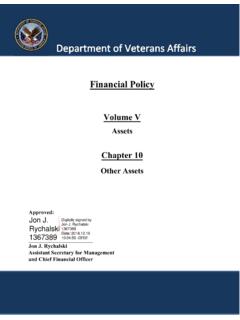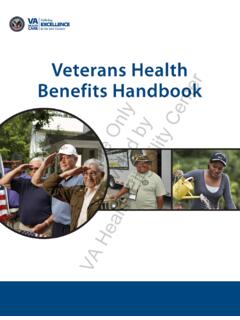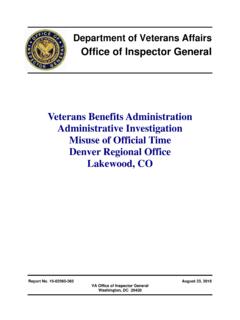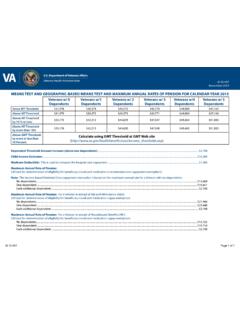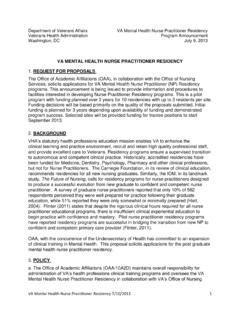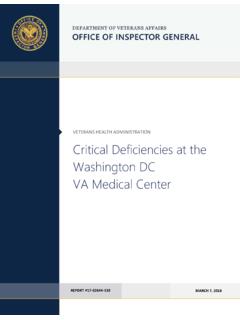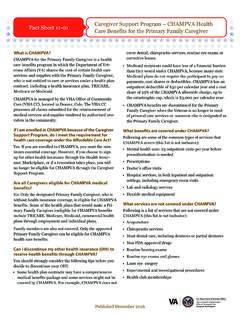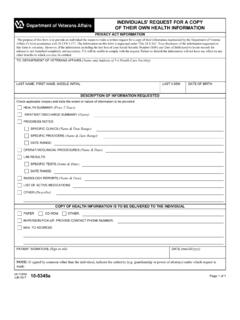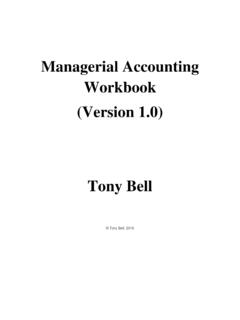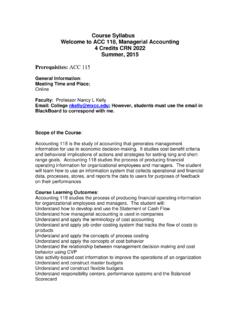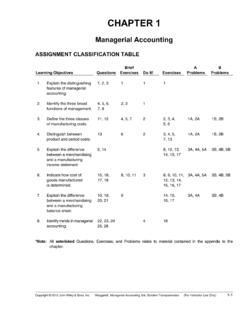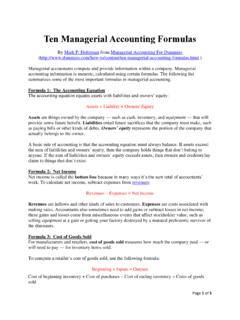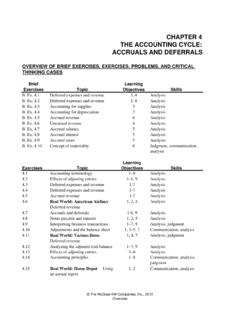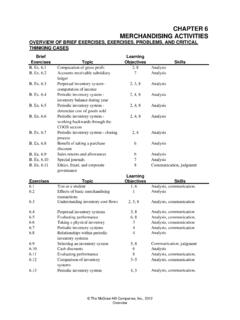Transcription of Vol III Chapter 3 Managerial Cost Accounting
1 _____ financial Policy Volume XIII Cost AccountingChapter 3 Managerial Cost AccountingApproved: Jon J. Rychalski Assistant Secretary for Management and Chief financial Officer Department of Veterans Affairs December 2019 Managerial Cost Accounting Volume XIII Chapter 3 1 0301 Overview .. 2 0302 Revisions .. 2 0303 Definitions .. 3 0304 Roles and Responsibilities .. 4 0305 Policies .. 5 030501 General Policies .. 5 030502 Managerial Cost Accounting System .. 5 030503 VA Administration Cost Accounting Requirements .. 6 030504 Labor Cost Considerations .. 8 030505 Property, Plant, and Equipment Cost Considerations.
2 9 030506 Managerial Cost Accounting Office .. 11 0306 Authorities and References .. 11 0307 12 0308 Questions .. 12 Appendix A: VHA Standardization of Stop Codes .. 13 Department of Veterans Affairs December 2019 Managerial Cost Accounting Volume XIII Chapter 3 2 0301 Overview This Chapter establishes the Department of Veterans Affairs (VA) financial policies for Managerial cost Accounting , which is a fundamental part of VA s overall financial management activities and should be integrated with the financial system for expenses, workload, utilization, performance measurement, and reporting. The Chief financial Officers (CFO) Act of 1990 requires the agency CFO to provide for the development and reporting of cost information and for the periodic measurement of performance.
3 The Federal financial Management Improvement Act of 1996 (FFMIA) requires, among other things, that CFO Act agencies systems comply substantially with federal Accounting standards and federal financial management systems requirements. In addition, the 2010 Government Performance and Results Modernization Act requires each agency to establish performance indicators for each program and to measure or assess relevant program outputs, service levels, and outcomes as a basis for comparing actual results with established goals, as such, cost Accounting information must be accumulated and reported on a consistent and regular basis.
4 VA implemented a Managerial cost Accounting system to: Perform cost Accounting and implement cost Accounting procedures; Identify cost products and services; Capture the full cost of products and services, including national and Veterans Integrated Service Network (VISN) overhead; and Include inter-agency costs as part of full costs and select and consistently use an acceptable costing methodology. Significant requirements discussed in this Chapter include: VA s Managerial Cost Accounting System adherence to federal cost Accounting requirements; VA s use of Managerial cost Accounting information to make business decisions; The transmission of Administration cost and workload data to the Managerial Cost Accounting Office (MCAO); and The use of the MCAO for reporting, analysis, budgeting, and modeling purposes.
5 0302 Revisions Department of Veterans Affairs December 2019 Managerial Cost Accounting Volume XIII Chapter 3 3 Section Revision Office Reason for Change Effective Date 030503 Added VHA VISN and Medical Center requirements for MCA data OFP (047G) Inclusion of requirements from VHA Directive 1750 allowing for the rescission of the Directive December 2019 030506 Added requirements for the MCA Office in the oversight of VHA MCA data OFP (047G) VHA Directive 1750 rescission December 2019 Various Reformatted to new policy format and completed 5-year review OFP (047G) Reorganized Chapter layout February 2019 Overall Replaced reference of Decision Support System with Managerial Cost Accounting System OFP (047G) Name change February 2019 0307 Rescissions Rescinded Vol XIII, Chapter 5, because OMB no longer requires certification that VA is using a cost Accounting system OFP (047G) Rescission of OMB A-127 February 2019 Appendix A Previous Appendix C was renumbered to A; information from other Appendices integrated into the policy section.
6 OFP (047G) Improve readability February 2019 Appendix C Added appendix for Veterans Health Administration (VHA) Standardization of Stop Codes VHA VHA Directive 1731 was reissued April 2018 0303 Definitions Direct Cost Costs directly attributable to a specific product. VHA examples include labor by caregivers, MDs, Nurses, Social Workers, and supplies and services consumed by patients. Veterans Benefit Administration (VBA) examples include staff processing claims, and National Cemetery Administration (NCA) examples include employees maintaining the cemetery grounds. Direct costs include contracted services. Fixed Cost Costs that do not vary in direct proportion to the volume of activity.
7 The Department of Veterans Affairs December 2019 Managerial Cost Accounting Volume XIII Chapter 3 4 word fixed does not mean that the costs do not fluctuate, but rather that they do not fluctuate in direct response to workload changes. Examples include depreciation of equipment and salaries of management positions. Full Cost Includes both direct and applicable indirect costs. MCA captures products at the full cost, which is cost recorded at the station, combined with overheads, such as headquarters and the Office of Information and Technology (OI&T). Indirect Cost The costs that are not directly attributable to a specific product.
8 These costs are allocated to direct departments through the indirect cost allocation process. Examples include utilities, maintenance, and overhead costs. All indirect costs are classified as fixed. Managerial Cost Accounting (MCA) System The Decision Support System (DSS) is the IT-based Managerial Cost Accounting system for the VA. It processes cost and workload data from various agency feeder systems to produce reliable cost per product data. Non-Production Cost An Exempt cost that does not have a corresponding workload capture. Non-Workload Cost A cost that does not have associated intermediate products or patient encounters.
9 In the MCA System, it is sometimes referred to as Exempt cost. (Contrast with Operational Cost). Operational Cost A direct or indirect cost that can be obviously or physically traced to the product or service. Costs are operational when there is workload capture. For example, clinical care delivered in a VA facility. In the MCA System, it is sometimes referred to as Non-exempt cost. (Contrast with Non-Workload Cost) Overhead Costs that cannot be directly linked to a particular product, service, or facility, but are incurred during the course of normal operations and are allocated to the facility or administration. For example, overhead includes costs allocated for headquarters, OI&T, VISN, National Programs, and VHA s Chief Business Office to individual facilities for inclusion in product cost.
10 Stop Codes (also known as VHA Clinic Stops) Codes used by VHA staff to correctly identify and capture clinical workload prior to its entry into the cost Accounting process. Variable Cost TA cost that varies directly and proportionately with fluctuations in workload. Variable direct cost is the variable supply cost plus the variable labor cost. 0304 Roles and Responsibilities Department of Veterans Affairs December 2019 Managerial Cost Accounting Volume XIII Chapter 3 5 Under Secretaries, Assistant Secretaries, Chief financial Officers, Fiscal Officers, Chief Accountants, and Other Key Officials are responsible for ensuring compliance with the policies and procedures set forth in this Chapter , and providing MCA data to the Managerial Cost Accounting Office.
